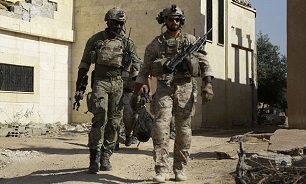Washington Plans Troops Buildup in Syria as US President Calls for Withdrawal
 The officials announced that the plans have been under discussion for several days and were first considered before President Donald Trump's remarks last Thursday that Washington would "be coming out of Syria like very soon", a CNN report said.
The officials announced that the plans have been under discussion for several days and were first considered before President Donald Trump's remarks last Thursday that Washington would "be coming out of Syria like very soon", a CNN report said.
It's not clear how the US President's remarks could affect the chances of the plan to send additional troops getting final approval.
Sources said they would focus on providing force protection for US forces already in the country, as US and British soldiers were killed in an IED blast in Manbij Syria days ago.
A National Security Council meeting is set for Tuesday to discuss the administration’s purported fight against Daesh (ISIS or ISIL) in Syria as well as the presence of thousands of US forces in Syria.
The US President in late March made a surprise announcement that American forces will be withdrawing from Syria, citing the defeat of ISIL and the need to defend US borders and rebuild crumbling infrastructure.
“We're coming out of Syria very soon. Let the other people take care of it now,” Trump said, complaining that the US has wasted trillions of dollars in Middle East wars, but gets "nothing" in return.
But, chief Pentagon Spokesperson Dana White stressed, hours before the President's remarks, the need for American forces to stay in Syria.
Also in January, then US Secretary of State Rex Tillerson announced that the US military would remain in Syria indefinitely.
The US and its allies have been bombarding what they call Daesh positions inside Syria since September 2014 without any authorization from the Damascus government or a UN mandate. Washington has reportedly more than 2,000 troops stationed in Eastern Syria, in addition to several thousand others in the Arab country's North.
The US administration officials have stated plans to keep troops in Syria even after the defeat of ISIL. Washington was once justifying its deployment of ground troops in Syria, which violates the embattled nation’s sovereignty, by citing the need to fight ISIL, but now it has started mentioning Iran's growing influence as its next excuse to remain in the war-ravaged country without a UN mandate or permission from the Syrian government.
A Pentagon official said in December 2017 the US military forces are poised to stay in war-ravaged Syria for “as long as we need to".
"We are going to maintain our commitment on the ground as long as we need to, to support our partners and prevent the return of terrorist groups," Pentagon Spokesman Eric Pahon stated.
A top Russian security official has stressed early March that the US has set up around 20 military bases in areas controlled by Kurdish militants it supports in Northern Syria, adding that Washington has provoked Turkey into launching military operation in the regions by providing the Kurds with advanced weapons.
Syria has on several occasions written to the UN, complaining that the US was flagrantly violating its sovereignty. Washington supports militants fighting to topple President Bashar al-Assad and has repeatedly attacked Syrian army positions.
